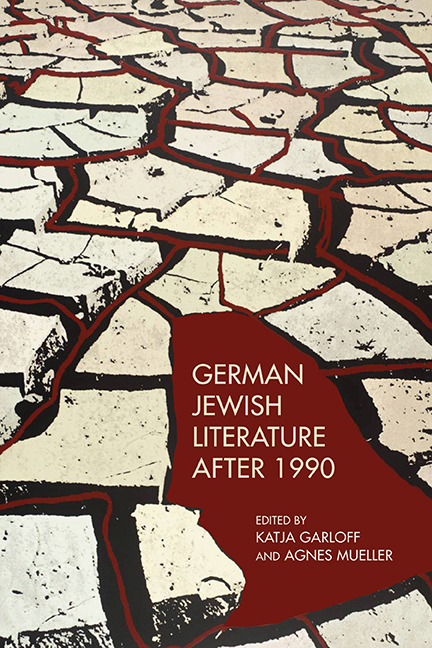Book contents
- Frontmatter
- Contents
- Acknowledgments
- Introduction
- I Self-Reflection in First- and Second-Generation Authors
- II Multiple Identities and Diversification of Holocaust Memory
- III New Themes and Directions in Recent German Jewish Literature
- 8 Actuality and Historicity in Mirna Funk's Winternähe
- 9 German Psycho: The Language of Depression in Oliver Polak's Der jüdische Patient
- 10 Religion and the Holocaust: Imre Kertész, Benjamin Stein, and Kaddish for a Friend
- IV Coda: Interviews with Two Contemporary German Jewish Writers
- Bibliography
- Notes on the Contributors
- Index
10 - Religion and the Holocaust: Imre Kertész, Benjamin Stein, and Kaddish for a Friend
from III - New Themes and Directions in Recent German Jewish Literature
Published online by Cambridge University Press: 07 September 2018
- Frontmatter
- Contents
- Acknowledgments
- Introduction
- I Self-Reflection in First- and Second-Generation Authors
- II Multiple Identities and Diversification of Holocaust Memory
- III New Themes and Directions in Recent German Jewish Literature
- 8 Actuality and Historicity in Mirna Funk's Winternähe
- 9 German Psycho: The Language of Depression in Oliver Polak's Der jüdische Patient
- 10 Religion and the Holocaust: Imre Kertész, Benjamin Stein, and Kaddish for a Friend
- IV Coda: Interviews with Two Contemporary German Jewish Writers
- Bibliography
- Notes on the Contributors
- Index
Summary
HUNGARIAN NOBEL LAUREATE and Shoah survivor Imre Kertész's 1990 work Kaddis a meg nem született gyermekért (Kaddish for a Child Not Born, 1992) engages the themes of religion and Holocaust memory. In his Kaddish, mourning —and prayer—is a prominent theme, but the mourning does not seem to be directed at a child, real or imagined, born or unborn. The mourning on display in the text itself is also not evocative of religious practice or ritual, or even of a more personal faith. Rather, the lamentation is about the narrator's past, his emotional detachment and estrangement from his wife, his lack of success as a writer, and the alienation he feels from religion as an institution, and, to a large extent, from Jewish culture and history. The text might be titled Kaddish for a Judaism Not Lived, since the absence of both religion and faith, and with this, the frailty of Jewish cultural identity, is a main theme throughout the book. Yet, the clearly Jewish and clearly religious ritual of the Kaddish prayer is still invoked. Of course, by 1990, “Kaddish” as a literary form could take on multiple determined meanings, specifically in view of literary history, including secular ones (such as, for example, in Allen Ginsberg's famous poem “Kaddish,” also known as “Kaddish for Naomi Ginsberg [1894– 1956]).” Yet, Ginsberg's “Kaddish” is, even though written as a poem, and obviously secular in its thematic and empathetic engagement, a mourner's appeal, dedicated to the memory of his mother, tenderly remembering her life—as would be expected also in a traditional and religious Kaddish. Kertész's text, on the other hand, is not reminiscent of a prayer, and the mourning that takes place seems rather truncated, even remote, as it mostly remains in the realm of a personal confession: “In this manner, just as I was a bad boy and a bad student, I was an equally bad Jew, I told my wife. My Jewishness remained a vague circumstance of my birth, just another fault among many, […].
- Type
- Chapter
- Information
- German Jewish Literature after 1990 , pp. 206 - 220Publisher: Boydell & BrewerPrint publication year: 2018



